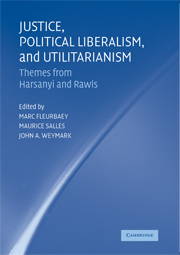Book contents
- Frontmatter
- Contents
- Preface
- List of Contributors
- 1 An Introduction to Justice, Political Liberalism, and Utilitarianism
- PART ONE THEMES FROM RAWLS
- PART TWO HARSANYI'S IMPARTIAL OBSERVER AND SOCIAL AGGREGATION THEOREMS
- 5 Harsanyi's Impartial Observer Is Not a Utilitarian
- 6 Social Aggregation and the Expected Utility Hypothesis
- 7 A Welfarist Version of Harsanyi's Aggregation Theorem
- 8 Preference Aggregation after Harsanyi
- PART THREE GOODNESS AND WELL-BEING
- PART FOUR SHARING THE GAINS FROM SOCIAL COOPERATION
- PART FIVE RIGHTS AND LIBERTIES
- Index
8 - Preference Aggregation after Harsanyi
Published online by Cambridge University Press: 09 February 2010
- Frontmatter
- Contents
- Preface
- List of Contributors
- 1 An Introduction to Justice, Political Liberalism, and Utilitarianism
- PART ONE THEMES FROM RAWLS
- PART TWO HARSANYI'S IMPARTIAL OBSERVER AND SOCIAL AGGREGATION THEOREMS
- 5 Harsanyi's Impartial Observer Is Not a Utilitarian
- 6 Social Aggregation and the Expected Utility Hypothesis
- 7 A Welfarist Version of Harsanyi's Aggregation Theorem
- 8 Preference Aggregation after Harsanyi
- PART THREE GOODNESS AND WELL-BEING
- PART FOUR SHARING THE GAINS FROM SOCIAL COOPERATION
- PART FIVE RIGHTS AND LIBERTIES
- Index
Summary
Introduction
Consider a group of people whose preferences satisfy the axioms of one of the current versions of utility theory, such as von Neumann–Morgenstern (1944), Savage (1954), or Bolker (1965)and Jeffrey (1965). There are political and economic contexts in which it is of interest to find ways of aggregating these individual preferences into a group preference ranking. The question then arises of whether methods of aggregation exist in which the group's preferences also satisfy the axioms of the chosen utility theory, while at the same time the aggregation process satisfies certain plausible conditions (e.g., the Pareto conditions introduced later).
The answer to this question is sensitive to details of the chosen utility theory and method of aggregation. Much depends on whether uncertainty, expressed in terms of probabilities, is present in the framework and, if so, on how the probabilities are aggregated. The goal of this chapter is (a) to provide a conceptual map of the field of preference aggregation – with special emphasis, prompted by the occasion, on Harsanyi's aggregation result and its relations to other results – and (b) to present a new problem (“flipping”), which leads to a new impossibility result.
The story begins with some bad news, roughly fifty years old, about “purely ordinal” frameworks, in which probabilities play no role.
Arrow's General Possibility Theorem (1950, 1951, 1963): No universally applicable nondictatorial method of aggregating individual preferences into group preferences can satisfy both the Pareto Preference condition (unanimous individual preferences are group preferences) and the condition of Independence of Irrelevant Alternatives (group preference between two prospects depends only on individual preferences between those same prospects).
- Type
- Chapter
- Information
- Justice, Political Liberalism, and UtilitarianismThemes from Harsanyi and Rawls, pp. 198 - 218Publisher: Cambridge University PressPrint publication year: 2008
- 5
- Cited by



